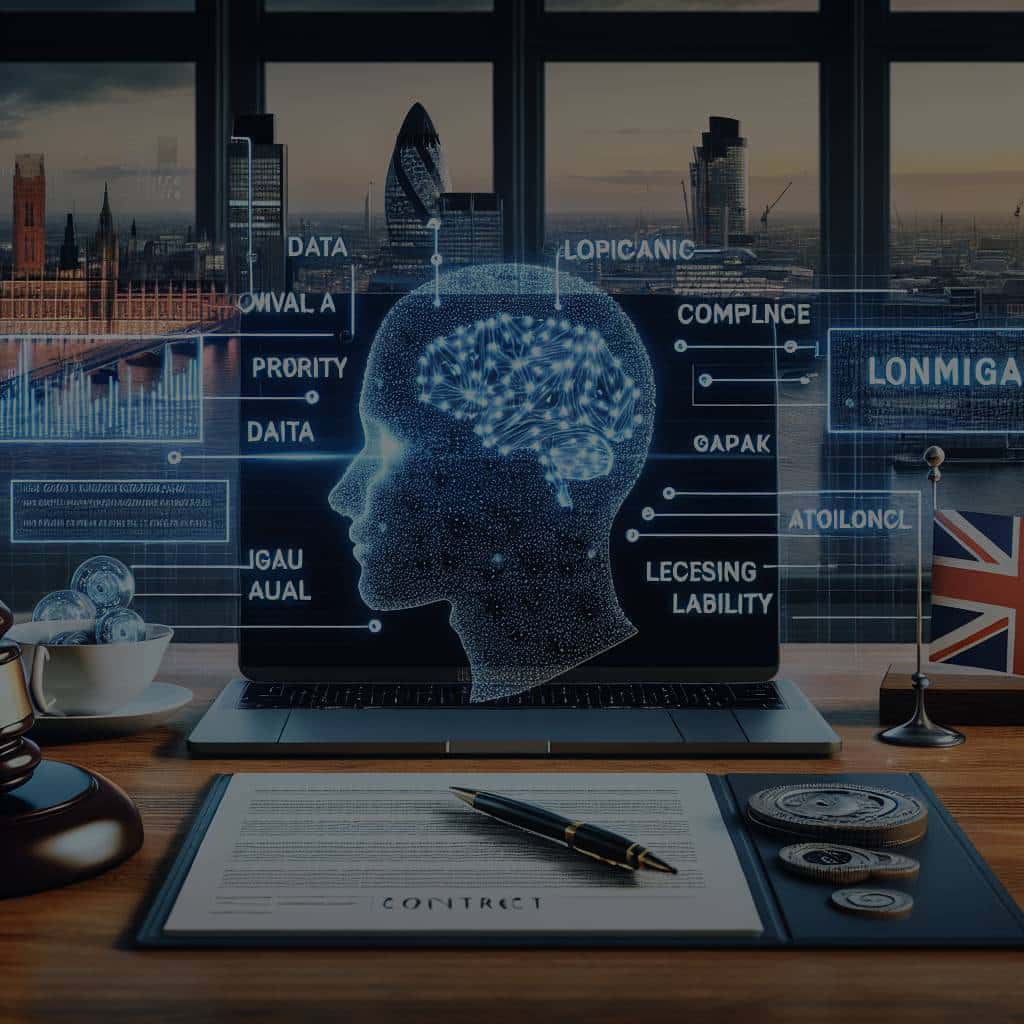As artificial intelligence (AI) continues to permeate various sectors of the economy, its impact on the legal profession cannot be understated. One area of interest is the use of AI in drafting and enforcing contracts, a phenomenon that is steadily gaining traction in the UK business sector. It is essential to explore the legal implications of AI contracts in this context, including data protection, contract models, and the rights of parties involved.
Data Protection and AI Contracts
The integration of artificial intelligence in contract creation and management systems poses significant data protection challenges. The use of AI necessitates the collection, processing, and storage of vast amounts of data, which may include personal and sensitive information. This situation raises questions about the protection of such data and the responsibilities of businesses in ensuring this protection.
Also to see : How to Implement Green Roofs in UK’s Urban Planning for Environmentally Friendly Cities?
Given the value that data holds in the contemporary world, businesses have a legal obligation to protect the data they handle, particularly where AI systems are used. Data protection is not just about safeguarding personal information; it extends to respecting the rights of data subjects, providing clear information about how data is used, and abiding by the principles of data minimisation and purpose limitation.
In addition to these general obligations, the UK’s Data Protection Act 2018 stipulates that businesses should carry out a Data Protection Impact Assessment (DPIA) when using new technologies such as AI, and if they handle data that could result in high risks to individuals’ rights and freedoms.
In the same genre : What Are the Latest Advances in Electric Vehicle Battery Technology in the UK?
AI Contract Models and their Legal Recognition
Another area of consideration when discussing the legal implications of AI contracts in the UK business sector is the status of the various AI contract models in the eyes of the law. At the core of this issue is whether these models are legally recognised and if their content can be enforced in a court of law.
AI contracts come in various forms, with generative and predictive models being among the most common. Generative models use data to create new content, such as contract clauses, while predictive models utilise data to forecast likely outcomes, such as contract breaches.
The legal recognition of AI contracts hinges on several factors, including the capacity of the parties involved to enter into a contract, the intention to create legal relations, and the existence of consideration. While these principles apply to contracts in general, the involvement of AI adds another layer of complexity. For instance, does an AI system have the legal capacity to enter into a contract? This is an area that is yet to be fully addressed by the law.
AI, Contracts, and the Rights of Parties Involved
The use of AI in contracting also raises issues concerning the rights of the parties involved. With AI systems being used to draft, negotiate, and enforce contracts, there are questions about how these technologies impact parties’ rights.
One area of concern is the potential bias that may be inherent in AI systems. If an AI system is trained using biased data, it could create contracts that unfairly favour one party over the other. In such cases, how do we ensure that the rights of the disadvantaged party are protected?
Further, with AI systems increasingly being used to enforce contracts, there are issues concerning the right to a fair trial. If an AI system makes a decision about a breach of contract, is it possible for the aggrieved party to challenge this decision in a court of law? Again, this is an area that the law is yet to fully address.
Role of Government and Legal Firms in Regulating AI Contracts
The legal implications of AI contracts are not just limited to businesses and other parties to a contract. They also extend to the government and legal firms, both of which play a critical role in regulating these types of contracts.
The government’s role in this context involves setting the legal framework within which AI contracts operate. This includes enacting legislation and regulations that address data protection, the legal status of AI contracts, and the rights of parties involved.
On the other hand, legal firms provide the services necessary to navigate the complexities of AI contracts. They offer advice on data protection obligations, assist in carrying out DPIAs, and provide representation in disputes arising from AI contracts.
In conclusion, it is evident that the use of AI in contract creation and management has significant legal implications for the UK business sector. As such, it is crucial for businesses, governments, and legal firms to understand these implications and take the necessary measures to address them.
The Impact of AI Contracts on Intellectual Property Rights and Decision Making
As artificial intelligence systems are deployed across various sectors such as the financial, legal, and real estate, one area that cannot be left unexplored is the impact of AI contracts on intellectual property rights. The use of AI in creating and managing contracts has the potential to disrupt traditional notions of intellectual property, particularly in cases where AI systems create unique content.
Intellectual property rights are intended to protect the creative output of individuals and corporations. However, in the context of AI contracts, it becomes challenging to define who holds the rights to the content created by AI systems. Does the AI system’s creator hold these rights, or do they belong to the party that uses the system to generate the contract? This grey area needs to be addressed to prevent potential disputes and violations of intellectual property rights.
Furthermore, the application of AI in contract creation and management significantly influences decision-making processes. For instance, predictive models can forecast the likely outcomes of a contract, informing the decisions of the parties involved. However, the reliance on AI for decision making raises concerns about transparency and accountability. If a decision based on an AI prediction leads to adverse outcomes, who is held accountable? Is it the AI’s creator, the user of the AI system, or the AI system itself?
The Future of AI Contracts in the UK Business Sector: The Need for a White Paper
Given the complexities and legal implications associated with AI contracts, there is a pressing need for a comprehensive white paper outlining the regulatory framework governing AI contracts in the UK business sector. Such a document should provide clear guidelines on issues such as data protection, intellectual property rights, and the legal recognition of AI-generated contracts.
A white paper would serve as a vital tool for businesses, law firms, and the government, providing clarity on the legal obligations and rights of all parties involved. For businesses, it would guide them on how to navigate the challenges of using AI in contract creation and management. For law firms, it would offer much-needed guidance on providing legal services related to AI contracts.
For the government, it would serve as a roadmap for enacting legislation and regulations that address the unique challenges posed by AI in contract law. The government’s role in this context is crucial, not only to protect the rights of businesses and individuals but also to maintain trust in the rapidly evolving world of AI.
Conclusion
The use of artificial intelligence in contract law, specifically in the creation and management of contracts, represents a significant paradigm shift in the UK business sector. While AI contracts have the potential to streamline processes and improve efficiency, they also raise several legal concerns. These concerns span data protection, intellectual property rights, decision making, and the rights of parties involved.
As such, businesses, law firms, and the government need to come together to develop a robust legal framework governing AI contracts. Such a framework should reflect the interests of all parties involved and ensure that the benefits of AI are realised without compromising legal obligations and individual rights.
Given the pace at which AI is evolving, this is not a task for the future, but a pressing issue that needs to be addressed immediately. The development of a comprehensive white paper could represent a crucial step towards achieving this goal.











